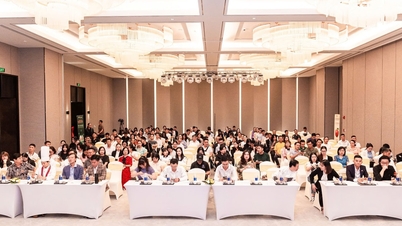
Nguyen Huu Thinh, a 12th grade student at Nguyen Thuong Hien High School, was a young player of the national U17 team. In the middle of the graduation exam, Thinh was still struggling to decide on his wishes.
“I loved sports since I was little, and dreamed of pursuing a football career. But after my injury, my parents told me to choose a safer path. Now I am considering economics , but I still regret my dream of becoming a football player.”
Not only Thinh, many other students are also forced to adjust their personal dreams because of concerns about "having difficulty supporting themselves" or finding a job.
Linh Dan, a 12th grade student at Thanh Khe High School, has been passionate about painting since childhood and dreamed of enrolling in an art school. “When I researched, I found that it was difficult to make a living as an artist, and my parents advised me to choose a major with a stable income. I am torn between pursuing my passion or switching to an economic field.”
Passion can be a starting point, but if you lack the right skills, or if your field of study does not have a clear output, it can easily become a burden. Many young people choose to "live during the day - dream at night": study a stable field to earn a living, and keep their passion as a hobby.
In many families, parents still play the role of “strategic orientation” – even making decisions for their children. Ms. Pham Thi Nguyet (An Khe ward, Da Nang ) has a son who is in grade 12 and is preparing to adjust his university aspirations. As a family with a tradition of doing business, she and her husband want their son to study business administration so that their parents can support and guide him, but their son is interested in being a TV announcer and wants to study Journalism.
“We are really worried that if he studies communications, his future will be uncertain. That field will be replaced by AI technology in the future. But he is not happy about being forced. Now the family is trying to find a compromise to harmonize wishes and reality,” Ms. Nguyet shared.
Ms. Trieu Giang, a career guidance teacher at a high school in Thanh Khe district, said: “Many students confided to me that they chose their major based on their parents’ wishes, not because they loved it. As a result, when they enter university, they easily get discouraged, drop out, or change their major completely after finishing school.”
She also emphasized: “Parents need to update career information and understand the changes in the labor market. Sometimes forcing a career on children is based on outdated beliefs, forcing them to learn.”
In the context of a constantly changing labor market, choosing a career based on social needs is a common trend. Industries related to technology, data, logistics, health care, tourism - restaurants - hotels... are clearly lacking in human resources.
Some universities are now no longer recruiting students based on minimum scores but have switched to considering academic records and competency interviews. The market is also gradually valuing practical skills, foreign languages, and creative thinking more than just relying on degrees.
However, Ms. Trieu Giang noted: “Many students choose the major because they see their friends taking the IT exam, so they also take the exam, but after the first year they drop out because it is not suitable. Some students choose a major that is 'easy to get a job' but after finishing school they realize they are not passionate about it and change direction.”
Choosing a major according to the market needs to be based on accurate information, have long-term forecasts, and most importantly: be suitable for yourself.
In the triangle of career choice – passion, ability, social needs – if one element is missing, the path will be shaky. But the most solid support is still understanding yourself.
Knowing what you are good at, what environment suits you, and what career is suitable for your personality are things that students need to discover early. Practical career guidance activities, job experiences, field trips to businesses, soft skills training, etc. need to be promoted in high school.
You cannot choose a major just because of “low benchmarks” or “hot majors”. Each student should have a personal path – where they discover themselves through each activity, each subject, each stumble.
Choosing a career is not a one-way ticket, but a journey. On that journey, you need to be alert, have enough information, listen to adults – and be able to adjust when necessary.
According to Ms. Trieu Giang, currently, students and parents are in the stage of adjusting and confirming their wishes. This is the time when dialogue is most needed instead of imposing or "letting the child want whatever they want".
No decision is perfect. But with the right information, support from parents, and listening to teachers, every student can enter the university door with confidence.
Passion is the starting material, social needs are the orientation, but understanding yourself is the real key to a sustainable career choice.
Source: https://baodanang.vn/chon-nghe-dam-me-dinh-huong-hay-nhu-cau-xa-hoi-3297971.html


![[Photo] General Secretary To Lam chairs the meeting of the Central Steering Committee on preventing and combating corruption, waste and negativity](https://vphoto.vietnam.vn/thumb/1200x675/vietnam/resource/IMAGE/2025/9/29/fb2a8712315d4213a16322588c57b975)
![[Photo] National Assembly Chairman Tran Thanh Man chairs the 8th Conference of full-time National Assembly deputies](https://vphoto.vietnam.vn/thumb/1200x675/vietnam/resource/IMAGE/2025/9/29/2c21459bc38d44ffaacd679ab9a0477c)
![[Photo] General Secretary To Lam receives US Ambassador to Vietnam Marc Knapper](https://vphoto.vietnam.vn/thumb/1200x675/vietnam/resource/IMAGE/2025/9/29/c8fd0761aa184da7814aee57d87c49b3)
![[Photo] General Secretary To Lam attends the ceremony to celebrate the 80th anniversary of the post and telecommunications sector and the 66th anniversary of the science and technology sector.](https://vphoto.vietnam.vn/thumb/1200x675/vietnam/resource/IMAGE/2025/9/29/8e86b39b8fe44121a2b14a031f4cef46)

![[Photo] Many streets in Hanoi were flooded due to the effects of storm Bualoi](https://vphoto.vietnam.vn/thumb/1200x675/vietnam/resource/IMAGE/2025/9/29/18b658aa0fa2495c927ade4bbe0096df)

































































































Comment (0)